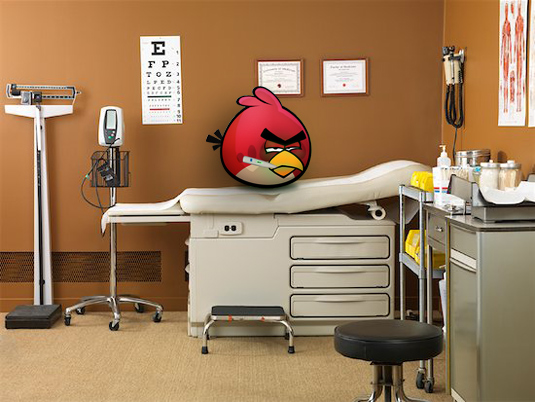Who would have imagined ten years ago that many of us would spend hours using a slingshot to fling hacked off birds on a single mission to destroy arrogant pigs? We do this using computers smaller than our dinner plates while sitting on airplanes, park benches, the family room sofa, and sometimes at work. For those of you who have not heard of the game “Angry Birds,” you should make this a goal over the holidays.
 The premise of the game is simple. The pigs have stolen the bird’s eggs and they want revenge. Each bird has their own specialty and the gamer has to use these specialties to destroy all the pigs in each scene. If they fail, the pigs laugh at you. If they win, the birds celebrate. Each scene gets a little harder to complete creating the addiction.
The premise of the game is simple. The pigs have stolen the bird’s eggs and they want revenge. Each bird has their own specialty and the gamer has to use these specialties to destroy all the pigs in each scene. If they fail, the pigs laugh at you. If they win, the birds celebrate. Each scene gets a little harder to complete creating the addiction.
Last week, I was part of a conversation describing physicians in much the same way. They are angry because they spent a lot of money to purchase an EMR solution that qualifies for Meaningful Use only to find the system forces them to change the way they practice, doesn’t meet all their needs, or isn’t going to be upgraded to meet Meaningful Use stage 2 requirements. We concluded many independent physicians are ready to find something better but they are afraid of losing their current investment of having to spend a lot of time and money migrating to a new system.
This is comparable to Angry Birds. It starts off easy then gets more frustrating. First, the physician uses paper to run their practice. This seems easy enough and has worked well for a long time. Soon the payers impose reporting and other rules that limit their freedom. Then the government steps in with new requirements. Unlike the payers, the government dangles a carrot in the beginning to feed the addiction. Pretty soon, the physician spends hours every day in unproductive time trying to eliminate their version of the pigs -the requirements.
Most software companies create something that is easy to develop, but does not readily embrace the actual business procedures. Their solutions work in theory but are often clumsy, sometimes impossible to fit into a physician’s business practice. They are closed systems that make it difficult to get data into and out of them, and many do not share information with related systems such as practice management or electronic prescription (ePrescribe) systems.
There are solutions on the market that address this. These are designed by architects who first understand the physician’s business and then create software to address these needs. These companies are intuitive enough to reverse the industry trend and design solutions that start with the business processes. There are not a lot so far, but they can be found with a little effort. Instead of angrily fighting the pigs, physicians can find these businesses and remove a lot of their angst. They should look for the following:
- A track record and testimonials of successful solutions
- Architects with actual healthcare industry experience
- Developers who understand the nuances of healthcare
- Companies who have practicing physicians who are directly involved in the design
Angry Birds is a game. Angry Doc’s is a tragedy. It doesn’t have to end this way.
